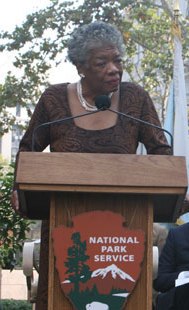Yesterday the world said good-bye to an icon of American literature. Maya Angelou is best remembered for her memoir, I Know Why The Caged Bird Sings. Much has already been written about Maya’s turbulent, early years and her rise to phenomenal success in the arts, literature and political activism. Many young people met Maya through her memoir, which was required reading in high schools, and for decades, Maya continued to educate us with her wisdom and mesmerize us with the magic of her words.

Maya Angelou with Bloomberg and Nadler (Photo credit: Wikipedia)
As a writer, I am always looking for words that stir my soul, quicken my pulse and thrill me beyond measure. Maya Angelou’s writing does that to me. This excerpt, taken from the poem Still I Rise is one of my favorites, and I daresay, the favorite of many:
Out of the huts of history’s shame
I rise
Up from a past that’s rooted in pain
I rise
I’m a black ocean, leaping and wide,
Welling and swelling I bear in the tide.
Leaving behind nights of terror and fear
I rise
Into a daybreak that’s wondrously clear
I rise
Bringing the gifts that my ancestors gave,
I am the dream and the hope of the slave.
I rise
I rise
I rise.
Gifted person that she was, Maya has left us a treasure trove of words that we as writers can live by. As I reflect on the life and passing of this “great light,” her words inspire me to remember that my beginning does not dictate my end. Maya’s light shines on.


English: Image at the beginning of Chapter 34. Darcy proposing to Elizabeth. Austen, Jane. Pride and Prejudice. London: George Allen, 1894. (Photo credit: Wikipedia)
[shareaholic app=’share_buttons’ id=’6822872′]
Some time ago I wrote a post about how important it is to create characters that your readers will love and will come to think of as friends. Think of Elizabeth in Pride and Prejudice, or Katniss in The Hunger Games. How can we forget these characters? According to Donald Maass in Writing The Breakout Novel, what makes a character memorable is their inner conflict.
Donald Maass says, “In creating genuine inner conflict, it is not enough simply to create inner turmoil. True inner conflict involves wanting two things that are mutually exclusive. It is most effective when it tears your protagonist, or any character, in two opposite directions.” In other words, if she gets one, she may have to give up the other.
In my novel, Coming Out of Egypt, I tried to do this with my protagonist, Cicely. She is a schoolteacher, a Christian, whose only desire is to go on living a Christian life, take care of her ailing father and help two of her former pupils get over the effects of their abusive past. Despite her best intentions, Cicely falls in love with the detective who is investigating the murder of the girls’ father.
Her conflict now becomes both internal as well as external when the detective, now her fiance, tells her he may have to arrest the older girl for her father’s murder. Cicely doesn’t want to see her pupil arrested for murder because she suspects the abuse is what may have driven her to kill him, if in fact she did. Also, if her fiance ever finds out that she too was abused as a child, would that mean the end of their relationship?
What conflict does your character face? Does he/she have to deal with external as well as internal conflict? Share with us in the comment box below.















